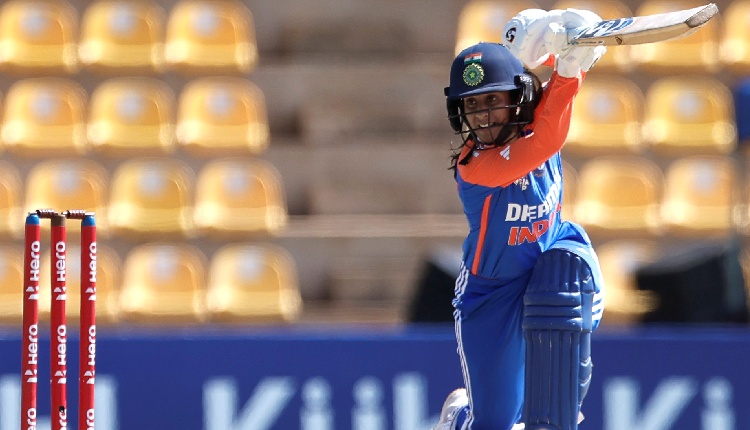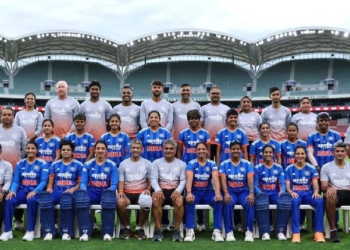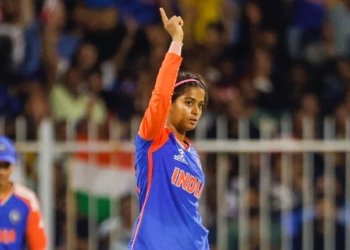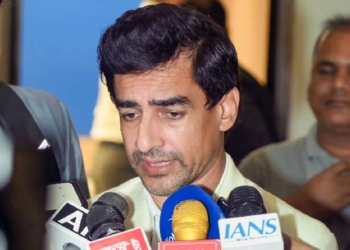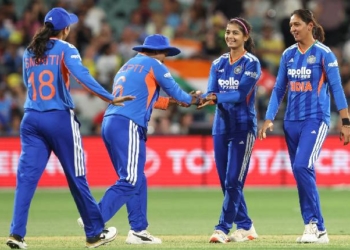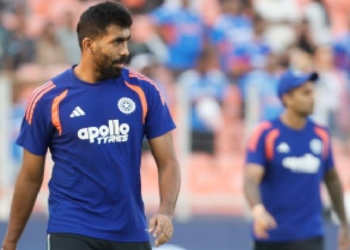New Delhi: When Jemimah Rodrigues made her international cricket debut for India as a 17-year-old against South Africa in February 2018, there were high hopes from her to continue Mumbai’s rich legacy of producing exceptional batters.
Since then, Jemimah has successfully navigated through numerous challenges to establish herself as a key batter in the national set-up. She has also become a familiar face in various T20 franchise leagues, who have grown significantly in numbers since Jemimah made her international debut.
Jemimah attributes her growth as a person on and off the field to her participation in the now-defunct Kia Super League (KSL) in England – her maiden appearance in an overseas T20 league. The numbers were exceptional — 401 runs coming at an average of 57.28 and strike rate of 149.62, including an unbeaten 112 off 58 balls.
Apart from on-field showings as a number four batter, instead of batting in top three, the experience of living alone abroad for a month transformed young Jemimah in positive ways. “I was just 18 when I travelled all alone abroad. I had to do everything on my own – from my laundry to cooking my own food, staying in apartments, and travel for games, apart from managing the money and everything.”
“So that experience changed me a lot, because I was not used to being alone in anything. Even in the Indian team, I was like the baby of the team, I was very loved and taken care of, and I knew everyone. But then this was a whole new thing – a lot of times I felt very alone and lonely. But that changed me a lot as a person, and made me more independent.”
“At the same time, I felt stronger in the sense that I was very young, and it was not easy for me being alone for an entire month. So that changed a lot and helped me in just to play the leagues, and I did really well there, and later, in all other leagues like The Hundred, WBBL, and WPL,” said Jemimah in a conversation with IANS, held earlier this month during a shoot for a clothing brand in New Delhi.
Despite frequent discussions around the club versus country debate and franchise leagues jostling for space in a packed international schedule, Jemimah takes great joy in rubbing shoulders with the best in business and gaining priceless experiences irrespective of the team she represents in T20 leagues.
“When we play in the dressing room with the England and the South Africa players, because that’s what WPL, WCPL and all these tournaments do – they give you exposure, so much learnings. Plus we are able to pick their minds when we share the dressing rooms and it’s not just us learning from them – they also learn so much from us.”
Another key attribute which a bubbly and easy going Jemimah has learnt from playing T20 leagues is sheer calmness, especially from her Delhi Capitals skipper, Australia’s five-time World Cups winning captain Meg Lanning, during two seasons of WPL.
“The way she leads the team, and is so calm under pressure – that is one thing I will really take from her. She just knows what she’s doing and that’s what helps her be calm even under pressure, which I feel that is one of the biggest qualities a captain can have. It’s because at the end everyone’s under pressure, but if you see your captain calm, it just has something that calms down the entire team.”
In this year’s Women’s Caribbean Premier League (WCPL), Jemimah turned out for Trinbago Knight Riders, alongside India teammate Shikha Pandey and Australia’s left-arm spinner Jess Jonassen. The trio played for Delhi Capitals in this year’s WPL and will be reunited again at the Brisbane Heat in the Women’s Big Bash League (WBBL), a prospect which Jemimah calls ‘crazy’.
In the tournament, where Jemimah made 105 runs in five innings at a strike rate of 108.24, an unbeaten 59 off 50, which took TKR to a four-wicket win over Barbados Royals with two balls to spare on a slow Trinidad wicket gave her ample confidence of finishing a match, a skill which India will need more of it during next month’s T20 World Cup in the UAE.
“Every knock was very important. It just teaches you a lot more. Yes, that was not officially a semi-final but actually a semi-final for our team. So that really gave me a lot of boost and confidence, because nothing like finishing a match for the team and winning it to help them reach the finals out of nowhere. But to adapt well to those conditions and do well, that gave me a lot of confidence of knowing how to play on different surfaces.”
With UAE being a venue which doesn’t host women’s T20I games regularly, Jemimah doesn’t think it is an entirely unknown entity for the Indian team, citing many players in the team have played in the Women’s T20 Challenge at Sharjah in 2020.
Once the tournament begins on October 3, India will resume its quest to win its first women’s T20 World Cup title. Jemimah reveals the Indian team’s discussions are more around focusing on their strengths, instead of wondering what their Group A opponents like Australia and Sri Lanka are likely to do in the competition.
In last year’s T20 World Cup semi-final, India gave an almighty fight, but fell five runs short of beating Australia in Cape Town. But that tournament saw Jemimah give India a bright start by hitting a 38-ball 53 not out in a pressure situation to pull off India’s highest successful run-chase in their history of being in the Women’s T20 World Cup.
In the lead-up to that game, Jemimah had no great knocks against her name. Hence, it was understandable that Jemimah was nervous the night before the clash against Pakistan, a match-up which brings added pressure on both teams.
“I was not in the best of form and then comes the big game against Pakistan – the entire world watching, especially in India. You know how the India-Pakistan rivalry is – all watchmen in the building come and tell me, ‘World Cup jeete ya na jeete, Pakistan ke against nahi haarna aap logon ko’ (Whether you win World Cup or not, you don’t have to lose against Pakistan).”
“To ease her nervousness, Jemimah followed her usual routine of going out for a walk. On the way, she stopped, looked upwards and said, ‘Thank you Jesus, last year at the exact same time I was dropped from the ODI World Cup, but this time I’m here’. “I just thanked him for that and it just changed my perspective – of just being grateful for where I was and how the journey wasn’t easy.”
Twelve months ago, Jemimah was left out of India’s ODI World Cup squad, a phase which she called a difficult and most challenging moment to still live through. Now, in Cape Town, on the cusp of playing the T20 World Cup, Jemimah remembered God, who was her pillar of strength in dark times.
“That gave me a lot of encouragement – like ‘okay, I was down but God picked me up and I’ve done it in the past, I can do it again’. So I think that was one of the first things that came to my mind and then just going there, my parents first time ever witnessing a live India-Pakistan match in the stadium.”
“It was even more special raising the bat towards them because more than anything else they supported me throughout that time. They believed in me no matter what, even when nobody believed in me, they were always there.”
With the support of her parents Ivan (who doubles up as her coach) and Lavita, present in the Newlands cricket ground for the Pakistan clash, as well as from coach Prashant Shetty, Jemimah managed to come out of a difficult time to be the lead architect of India’s win a day before the fifth anniversary of her international debut in South Africa.
“So that was special and even more special thing was that just the next day marked five years for me playing international cricket on that very same ground I played back in 2018. I have a similar jumping picture and if I look back from where I was then to where I was present at that time, it’s very special to see how far I’ve come and how far God has brought me. I had no clue of that similar jump, but someone put it on social media and I was like, ‘oh damn’.”
In the shortest format, Jemimah has primarily been a top-order batter, but the upcoming T20 World Cup might see her play at number five. She cites it as the team’s belief of her being able to make a massive difference there for India, as seen from her making a 29-ball fifty against South Africa at that position in Chennai.
She also feels excelling at number five in T20Is is all about adapting to situations, conditions and the mindset remains the same. “I’m just trying to be a little more aggressive and positive because sometimes situations at number five are very different from three, as there it’s more like you build innings, partnerships, run and do everything to set a momentum and tempo.”
“At five, you already know the situation and from there you have to take whatever comes. So I’ve been working a lot on that, like going all out from the first ball because sometimes in a match, you may need six runs off one ball and I want to be prepared for that at five.”
Going after the bowlers isn’t a part of Jemimah’s natural game, as she relies more on her pristine timing, using the crease for manipulating the bowlers. If needed, unfurl her pulls and slog-sweeps effortlessly against spinners.
The WPL 2024 saw Jemimah play more powerful shots to clear the fences, seen from her hitting eight sixes overall and strike-rate standing at a healthy 153.59. She asserts that the power-hitting side of her work is still going on.
“I have to put a lot more effort maybe compared to others, because my game is more around timing and manipulating gaps. I’m glad to see it coming at the right time, so I keep working on it. My dad always tells me that you don’t need to be a muscular person to score runs. You just need to have brains and get runs your way, and that is one of the best advices I’ve got and I try to stick to that.”
“She also looks up to the talismanic and match-winning Virat Kohli for inspiration, as he’s also not a big six-hitter, but is high on timing and splitting gaps to ace T20 batting. We have very similar batting styles. It’s not like Virat Kohli can’t hit sixes, but whenever he hits sixes, he hits it in the gaps, so that even if he mistimes, he can still get four or two runs and maybe one run, but he won’t be catch out.”
“So that is very smart cricket he plays and that’s what I try to add to my game. More than anything, I am just sticking to my process and the style that suits me, like he also runs well between wickets, builds his innings, and likes working hard through it.”
Other aspects of the Indian team which will be keenly watched in the T20 World Cup are fielding and fitness, termed non-negotiable by head coach Amol Muzumdar. Jemimah talked about how a recent camp at the National Cricket Academy (NCA) was centered around fitness and fielding, with the bat being hardly touched.
She also cites strength & conditioning trainer Anand Date, fielding coach Munish Bali and other support staff members helping them be the best in these two skillset. On July 4, a sea of supporters totally packed Mumbai’s Marine Drive to celebrate India’s T20 World Cup victory, as the open-top bus housing Rohit Sharma & Co along with the glittering trophy greeted fans on their way to Mumbai’s Wankhede Stadium.
Jemimah dreams of a similar reception meeting her team at home if they go on to win the title at the Dubai International Stadium on October 20. With her name meaning ‘dove’ in Hebrew, one will be hoping the chirpy, inventive and athletic Jemimah plays a key role in India winning its first-ever Women’s T20 World Cup.
(IANS)




